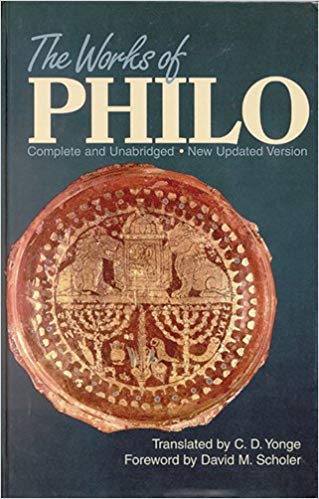File:1993 * Yonge.jpg
1993_*_Yonge.jpg (319 × 499 pixels, file size: 37 KB, MIME type: image/jpeg)
The Works of Philo is the new edition of The Works of Philo Judaeus (1854-1855 Yonge), book.
Abstract
While it would not be correct to say that Philo's works have been "lost"--scholars have always known and used Philo--they have essentially been "misplaced" as far as the average student of the Bible is concerned. Now the translation of the eminent classicist C. D. Yonge is available in an affordable, easy-to-read edition, with a new foreword and newly translated passages, and containing supposed fragments of Philo's writings from ancient authors such as John of Damascus. The title and arrangement of the writings have been standardized according to scholarly conventions. A contemporary of Paul and Jesus, Philo Judaeus, of Alexandria, Egypt, is unquestionably among the most important writers for historians and students of Hellenistic Judaism and early Christianity. Although Philo does not explicitly mention Jesus, or Paul, or any of the followers of Jesus, Philo lived in their world. It is from Philo, for example, that we learn about how, like the Gospel of John, Jews (and Greeks) in the Greco-Roman world spoke of the creative force of God as God's Logos. Philo, too, employs interpretive strategies that parallel those of the author of Hebrews. Most scholars would agree that Philo and the author of Hebrews are drawing from the same, or at least similar, traditions of Hellenistic Judaism. With these kind of connections to the world of Judaism and early Christianity, Philo cannot be ignored."--Publisher description.
Editions and translations
Originally published in London: Henry G. Bohn, 1854-55. Reprinted several times in London: G. Bell, 1856-1900. Reissued in Peabody, MA: Hendrickson, 1993.
Table of contents
On the creation -- Allegorical interpretation, I -- Allegorical interpretation, II -- Allegorical interpretation, III -- On the Cherubim -- On the birth of Abel and the sacrifices offered by him and by his brother Cain -- That the worse is wont to attack the better -- On the posterity of Cain and his exile -- On the giants -- On the unchangeableness of God -- On husbandry -- Concerning Noah's work as a planter -- On drunkenness -- On the prayers and curses uttered by Noah when he became sober -- On the confusion of tongues -- On the migration of Abraham -- Who is the heir of divine things -- On mating with the preliminary studies -- On flight and finding -- On the change of names -- On dreams, that they are God-sent -- On Abraham -- On Joseph -- On the life of Moses, I -- On the life of Moses, II -- The Decalogue -- The special laws, I -- The special laws, II -- The special laws, III -- The special laws, IV -- On the virtues -- On rewards and punishments -- Every good man is free -- On the contemplative life or suppliants -- On the eternity of the world -- Flaccus -- Hypothetica : apology for the Jews -- On providence : fragment I -- On providence : fragment II -- On the embassy to Gaius : the first part of the treatise on virtues -- Questions and answers on Genesis, I -- Questions and answers on Genesis, II -- Questions and answers on Genesis, III.
External links
File history
Click on a date/time to view the file as it appeared at that time.
| Date/Time | Thumbnail | Dimensions | User | Comment | |
|---|---|---|---|---|---|
| current | 08:36, 24 July 2018 |  | 319 × 499 (37 KB) | Gabriele Boccaccini (talk | contribs) |
You cannot overwrite this file.
File usage
There are no pages that use this file.
- 1993
- 1990s
- English language--1990s
- Hellenistic-Jewish Studies--1990s
- Hellenistic-Jewish Studies--English
- Philo Studies--1990s
- Philo Studies--English
- Second Temple Studies--1990s
- Second Temple Studies--English
- Philo's Works (subject)
- Philo's Works--English tr. (subject)
- Top 1990s
- Scholarship--Top 1990s
- English language--Top 1990s
- Philo Studies--Top 1990s
